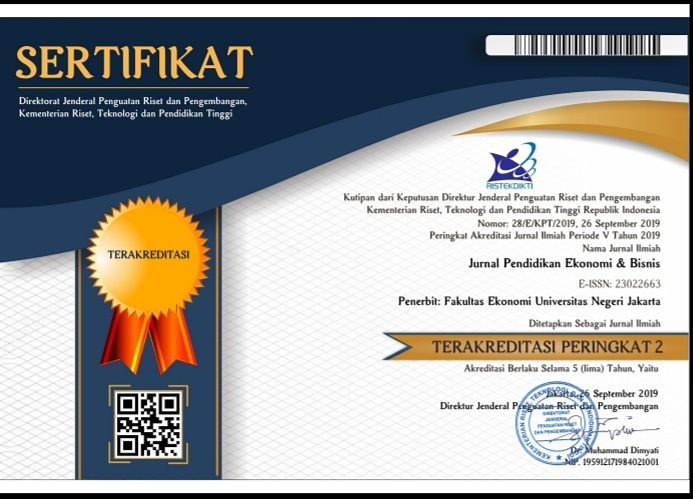LOCUS OF CONTROL DAN PROKRASTINASI PADA MAHASISWA PENDIDIKAN EKONOMI ANGKATAN 2013 FAKULTAS EKONOMI UNIVERSITAS NEGERI JAKARTA
DOI:
https://doi.org/10.21009/JPEB.004.2.1Keywords:
locus of control, procrastinationAbstract
This study aims to determine wheather there is any effect on the Economics of Education student procrastination force in 2013 Faculty of Economics, Universitas Negeri Jakarta. This research was carried out for 2 months starting from the month of May 2016 to June 2016. The research method used is survey method with the correlational approach. The population in this study were students of Economic Education in 2013 totaling 210 students. According to the table and sample population with 5% level of misunderstanding the obtained sample of 210 students. X variable data about the locus of control is the primary data in the form of questionnaire and Y about procrastination is the primary data in the form of a questionnaire. Test requirements analysis done is to find the regression equation obtained was Ŷ= 139,57+0,74X. Normality test results Liliefors produce Lhitung = 0,0764 dan Ltabel = 0,0786 at the significance level (a) = 0:05 to the number of samples (n) 127. Because Lhitung= (0,0764) < L tabel = (0,0786) then the variable X and Y have normal distribution. Testing the hypothesis with a significance test of regression produces Fhitung (86,89) > Ftabel (3,939), which means a significant regression equation. produce regression linearity test of Fhitung (0,19) < Ftabel (1,59) so Fhitung< Ftabel it can be concluded that the model is a linear regression equation. Product moment correlation coefficient generating rhitung = -0.6403. T-test produces thitung (-9,321)> ttabel (1.979). Thus it can be stated correlation coefficient rxy = -0.6403 is significant. The coefficient of determination obtained at 41,01% indicates that 41,01% variable procrastination is determined by the locus of control and the remaining 58,99% influenced by other variables not examined. Based on the results of this study concluded that there are significant negative and significant correlation between locus of control with procrastination on Economic Education class of 2013 student Faculty of Economics, Universitas Negeri Jakarta.
Downloads
Published
How to Cite
Issue
Section
License
Articles in Jurnal Pendidikan Ekonomi & Bisnis are Open Access articles published under the Creative Commons CC BY-NC-SA License This license permits use, distribution and reproduction in any medium for non-commercial purposes only, provided the original work and source is properly cited. Any derivative of the original must be distributed under the same license as the original.








